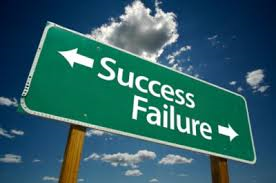Here’s a question that should strike close to home. Professional investors like to quote this mantra to anyone who will listen. “Fail fast,” they say. But what if you believe so strongly in your budding enterprise that this seems to be the most ill-advised directive you’ve ever heard?
So here are some rules that might make it clearer for you and for those who so easily quote the mantra.
Rules to consider as tests of early success.
With the first round of funding, there should be agreed-upon milestones to be achieved. If  they are not achieved within the expected time, the reasons must be analyzed by you and by your board and acted upon to avoid loss of capital beyond plan or expectation.
they are not achieved within the expected time, the reasons must be analyzed by you and by your board and acted upon to avoid loss of capital beyond plan or expectation.
If you discover and become convinced that your vision is flawed, or the product impossible to create within cost and time expectations, or the demand impossible to quantify, or revenues never close to plan, then it would certainly be time to rethink the plan and product.
Could you pivot to save the company?
Could you and your team pivot if given the time and runway to do that? Would that restart the clock, putting even more pressure upon you to perform? Your investors know that an excellent management team is perhaps the greatest asset for any company – because it is just this team that has historically been able to make a drastic alteration of the plan, ultimately making a failing vision into a wildly successful one.
[Email readers, continue here…] But if neither great management nor your vision for the product shows real signs of success in the market, then it may surely be time to listen to the investors and perhaps the board. Fail fast! Reduce further expenditures of remaining capital and protect the assets purchased with the original investment.
A personal story of failing fast
 My favorite story of a fast failure was of a technology incubator started in the year 2000 with optimistic money from several angel investors, including me. Within a month after the tech crash, the founder of the incubator decided that it made no sense to incubate companies that were not likely to receive new investments soon following incubation in the winter-of-cash that followed the tech crash. He volunteered to close the incubator and he returned 96% of our investments to all of us angel investors. (That return proved to be the best investment return any of us saw in the several years that followed.)
My favorite story of a fast failure was of a technology incubator started in the year 2000 with optimistic money from several angel investors, including me. Within a month after the tech crash, the founder of the incubator decided that it made no sense to incubate companies that were not likely to receive new investments soon following incubation in the winter-of-cash that followed the tech crash. He volunteered to close the incubator and he returned 96% of our investments to all of us angel investors. (That return proved to be the best investment return any of us saw in the several years that followed.)
Is it the end of your entrepreneurial world to fail quickly?
Half of all professionally managed venture capital or angel investments fail. There should be no shame to the entrepreneur in admitting such a failure. Some angel and VC investors will give special credit to those entrepreneurs who have experienced failures when investing in their next effort. The lessons learned are difficult to teach and are great assets in the next effort.
There is little shame and quite a reputation boost in acknowledging a failing plan and “failing fast.”






I loved this short and succinct blog / article on “Fail Fast”. Very insightful because of your own experiences presented here. Thank you.
I believe you see that some ideas are worth going the full mike no matter what it takes. You see people like Jobs who stayed true to his vision through so much. I think these kinds of ideas that a truly game changers are few and far between and I’ve closed several companies quickly because of market indicators.
I love your blogs. Keep up the good work!
This should be required reading for anyone going into business. C
An entrepreneurial disappointment can be tuitional. if the reasons for the failure are understood, in terms of the entrepreneur’s next venture. Ease of entry into commercial ventures invites the insufficiently prepared to accept risks for themselves and others.
There is a broadly accepted fiction that tenacity is the key entrepreneurial success. I believe that knowing when and how to quit is the key to immediate and subsequent survival. The use of a “What If” (can go wrong) list, particularly one which is shared with investors, is critical to assessing the adequacy of resources. A fairly and honestly closed businesses can give prospective investors in the next venture confidence in the entrepreneur.